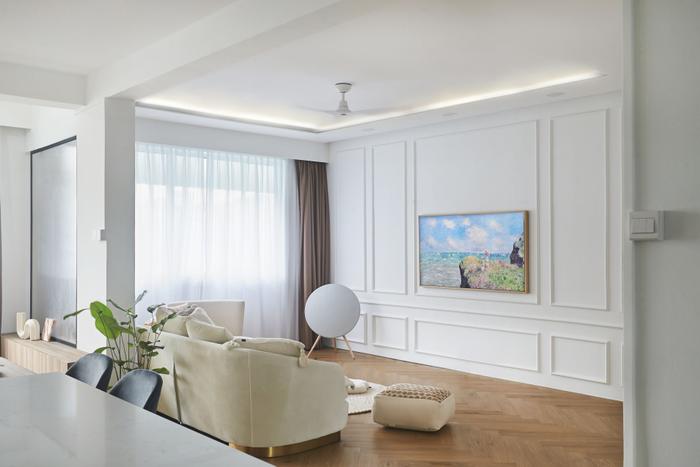Boasting a new open concept space, this home also incorporates subtle classical touches for a unique flair.
Old resale flats – particularly those built in the ‘80s or before – aren’t always in the best condition. Case in point: the original state of this 34-year-old resale HDB flat in Bukit Panjang – which, as Aart Boxx designer Yang Ming puts it, was “quite scary”.

“In terms of condition, it really wasn’t the best,” he says. “The electrical wires were quite old, the lighting was dark, and the layout was cramped because of all the walls [limiting the space].”
“Also, this house is on the highest floor, and probably has one of the tallest HDB ceilings I’ve worked on – it’s quite uncommon even among old rooftop units, so we had to think of ways to work around that.”

But no home is too dire for a makeover – and looking at it now, it’s hard to believe that it ever was old and drab in the first place. Below, Yang Ming shares more about the home and its drastic makeover, which took him about 3-4 months to complete.
About the house and the process of designing it
Yang Ming (YM): The condition of the house created a few structural obstacles, and made carpentry [works] quite challenging.

For instance, some of the walls were uneven and slanted, so we had to do some plastering before installing the built-ins.
The high ceiling also created some difficulties when we were transporting units over. Since the kitchen doors were taller than usual, they were too big to fit into the lift. We had to manually carry the kitchen doors all the way up.

The floorplan, pre-renovation
Also, there were quite a few layout changes because the owners wanted a bright, spacious-looking home. We tore down the walls in the kitchen, balcony, and study to open up the communal area, and also combined the master bedroom with the junior bedroom to create a master ‘area’.

The floorplan, post-renovation
WATCH: Aart Boxx designer Yang Ming talks about the flat’s renovation
About the balcony, dining area and kitchen

The balcony and dining area, pre-renovation
YM: There was initially a sliding door separating the balcony and the dining room, but we decided to remove it and open up the space. If not, the kitchen island would be too close to the sliding door, which would obstruct movement.

The balcony, dining area and kitchen, post-renovation
Plus, the space itself is quite long – it gives you the impression of a large place, since you’re able to look across it without interruption. If I’m not mistaken, the entire length [from the balcony to the kitchen] is almost 12 metres, which gives me the space to put in long stretches of cabinetry.

We divided the kitchen into a wet and dry area to separate the space. The wet area is for heavy cooking, while the dry kitchen is more like a pantry for lighter food prep and for people to gather around.
For a cafe-style vibe, we installed a custom kitchen island and table, with little details like beadboard and fluted panels for visual interest. Usually, it’s where guests will gather around to chat, but the owners themselves just use it as their dining table.

About renovating the living room

YM: The homeowners are very interested in Taiwanese interior design theme because it exudes a simple, yet sleek vibe. They actually did a lot of research before coming to us, and during that time, the trend leaned more towards modern luxury, with a pinch of classic details.

So, that’s the look we went for here. We painted the walls white to keep the look clean, but added little details like wainscotting and antique cornices to make the space look like a classic art gallery.
“We also concealed the store room door and turned it into a sort of ‘feature wall’,” says Yang Ming.
The gold elements here and there, as well as the herringbone vinyl floors, were purposely chosen to add luxe touches to the space.
On creating the walk-in wardrobe
YM: If you look at the floor plan, you’ll notice that the walk-in wardrobe is actually where the original master bedroom used to be – we thought it would make more sense for it to be next to the bathroom in terms of function.

For the wardrobe itself, we chose reeded glass doors over clear glass doors to minimise visual clutter while retaining the open look concept. There’s actually a built-in motion sensor that creates a backlit effect when you slide open the door, which looks quite glamorous.

We also thought that this would be a good place to put in the glass blocks, which were a popular feature in Taiwan during the time of the renovation. As a finishing touch, we used a PU spray to create a matte look that’s also easy to maintain.
On renovating the master bedroom

YM: The idea to include two doorways here came from the owners as well, to create easy access to either side without needing to walk all the way around. The double-leaf doors were also sourced by them – they really liked its vintage European look as it complements the classic details outside.

Inside, we included a grey accent wall – not just to make something different, but also to create a restful, calming vibe. The study table was also pushed up against the wall instead of the window as it maximises the amount of natural light while giving the owners the option to include shelving on top.

View this project by Aart Boxx Interior
About the common and master bathroom
YM: Both the common and master bathrooms have similar black fittings – they were chosen on purpose to contrast the white walls.

However, we did things differently for each bathroom. Since the master bathroom is where the owners would dress up and get ready, we shifted the vanity outside to create a sort of ‘dry area’. It’s also more comfortable for them, since there’s better air flow outside.

We didn’t do this for the common bathroom, but we thought that using glass blocks as a shower screen would be quite unique. I think it’s also better than normal glass screens because the embossing makes dirt and stains less obvious.
To sum up

YM: Transforming this home was really challenging, especially since the renovation took place during the COVID-19 period. Overall, I think it took us almost 3-4 months to finish everything.
However, I really like how this project turned out, especially the bedroom and wardrobe area. But more importantly, my clients are happy with it, too!

 Get a budget estimate before meeting IDs
Get a budget estimate before meeting IDs